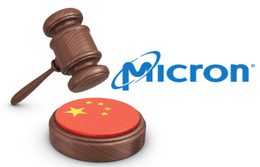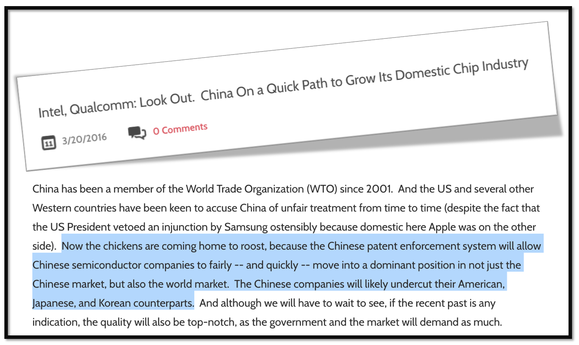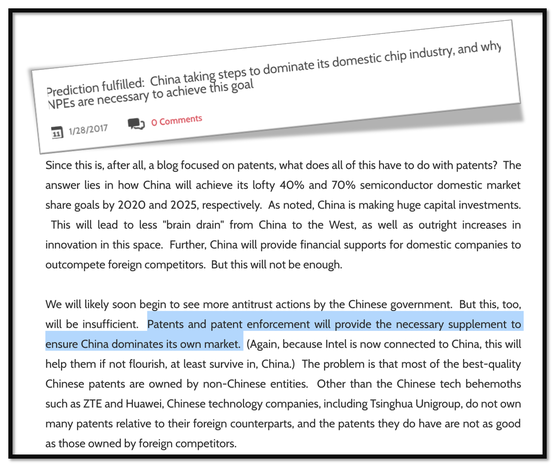 This past week, we found out that the Intermediate People’s Court in Fujian, China issued a preliminary injunction against Micron in favor of Taiwan-based UMC and Fujian-based Jinhua. See the great article by IAM here. The injunction covers “certain Crucial and Ballistix-branded DRAM modules and solid state drives. The surprising aspect was not necessarily that an injunction was issued (this happens in over 95% of Chinese patent wins) but that this was a PRELIMINARY injunction ("PI"). Like most jurisdictions, including the US, it is difficult in China to obtain a PI. The main reason is proving infringement and that the patent holder will be irreparably harmed. Specifically, Chinese courts generally consider the following factors in determining whether to issue PIs in patent cases:
Many sources seem to assume that there was some political forces at play in the Fujian court's decision. I do not dispute that surely the plaintiffs here had the hometown advantage. However, I believe the power of this advantage is not as significant as others may assume. There is a reason that in the Eastern District of Texas was popular as a venue. Similarly, there is a reason that large companies like Google have contributed a fortune in lobbying the US government to ensure they can be sued only in Northern California or Delaware. In any case, a leading US semiconductor has been -- at least temporarily -- enjoined from making, using, selling, importing, or exporting its products. So if there are political forces are play, what are they? Well, I predicted them here: ... and here: To reiterate, China is very likely to use its patent enforcement system to catch up in areas of technology it feels are important. China sees its huge foreign dependence for semiconductors as a national security issue. This is entirely reasonable given that semiconductors are the brains behind every device we use these days, including surveillance, computing, and artificial intelligence.
The Chinese patent litigation play could several ways. For one, NPEs attacking foreign competitors to Chinese companies will help. A more "Jedi mind trick" play, though, is to for Chinese companies to simply attack their foreign competitors in patent litigation. When the Chinese company wins the case and gets their injunction, that's when the magic comes in. With their boot on the neck of their foreign competitor, they can name their price for settlement. This price could come in terms of money, but it could mean sharing sensitive technologies -- technologies that China cannot buy due to the US increased protectionism and the Committee on Foreign Investment in the United States (CFIUS). Because settlements are generally confidential and not reported, such forced technology transfer may fly under the US radar. No matter how important the "home field advantage" was in the latest Micron case, it likely played some role. Fortunately for Micron, the patents covered only a portion of its products. But this is not the end -- far from it. At some point, the US may find that it would have been easier to simply approved the purchase of Micron by Tsinghua Unigroup. |
Welcome to the China Patent Blog by Erick Robinson. Erick Robinson's China Patent Blog discusses China's patent system and China's surprisingly effective procedures for enforcing patents. China is leading the world in growth in many areas. Patents are among them. So come along with Erick Robinson while he provides a map to the complicated and mysterious world of patents and patent litigation in China.
AuthorErick Robinson is an experienced American trial lawyer and U.S. patent attorney formerly based in Beijing and now based in Texas. He is a Patent Litigation Partner and Co-Chair of the Intellectual Property Practice at Spencer Fane LLP, where he manages patent litigation, licensing, and prosecution in China and the US. Categories
All
Archives
February 2021
Disclaimer: The ideas and opinions at ChinaPatentBlog.com are my own as of the time of posting, have not been vetted with my firm or its clients, and do not necessarily represent the positions of the firm, its lawyers, or any of its clients. None of these posts is intended as legal advice and if you need a lawyer, you should hire one. Nothing in this blog creates an attorney-client relationship. If you make a comment on the post, the comment will become public and beyond your control to change or remove it. |






 RSS Feed
RSS Feed